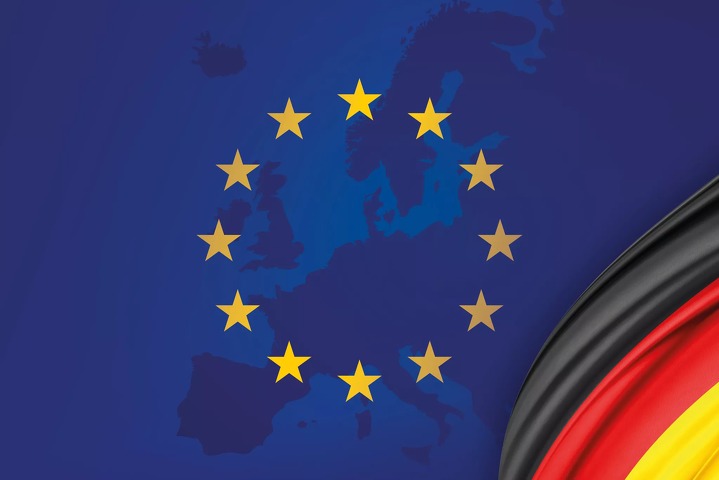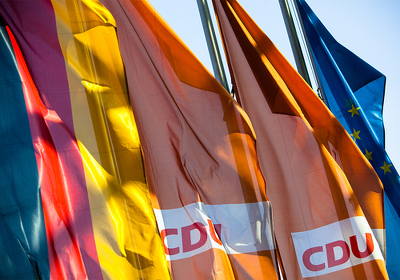
Germany’s Role of Harmonisation in the European Decision-making
Brussels Office | Foreign and Security Policy
Brussels Office

Brussels Office | Foreign and Security Policy
The Brussels Office of the Antall József Knowledge Centre organised an online expert exchange on Germany’s Role of Harmonisation in the European Decision-making on 4 March 2021. In his opening remarks, Dr Balázs Hamar, Head of the Antall József Knowledge Centre’s Brussels Office highlighted how important the relationship between Prime Minister József Antall and Chancellor Helmut Kohl was. Dr Hamar also gave two present-day examples of Germany’s importance in the European leadership: on the one hand, the German presidency of the European Council that played a significant role in the success of the COVID-19 crisis management, and on the other hand, the great economic relevance of the German industry in Europe. During the panel discussion moderated by Elina Herédi, International Relations Manager of the Antall József Knowledge Centre, experts Volkmar Klein, Gergely Prőhle, Matthew Rhodes and Éric-André Martin discussed the European and transatlantic implications of the upcoming German elections.
Speakers agreed that the elections this September will be very different from those that took place in the past decades, both because of the uncertainties caused by the COVID-19 pandemic and also because the political and foreign policy environment has significantly changed. Angela Merkel’s CDU has so far benefited from the efficient management of the crisis, but a slow vaccine roll-out might shift public opinion. Éric-André Martin, Secretary General of the Committee on Franco-German Relations at the French Institute of International Relations (IFRI) emphasised that the most important question of the upcoming German elections is what kind of coalition can be built – green-conservative or green-socialist - as it not only influences the course the CDU takes before the elections but it will also have an impact on the future course of the European Union. Armin Laschet is expected to be the CDU’s nominee for the elections and the German regional polls will be good indicators of what kind of outcome can the September vote bring.
While discussing the achievements of the German Presidency of the European Council, experts said that it was a great challenge to balance the crisis management with the European Union’s strategic goals. Volkmar Klein, Member of the German Bundestag highlighted that while the management of the Eurozone crisis was very different from the current economic crisis, the German approach remained fully consistent. The current economic crisis is an EU-wide one caused by external factors and therefore the main goal of crisis-management is to prevent growing economic heterogeneity between the Member States while increasing European competitiveness. The Recovery Fund in addition to boosting competitiveness in the whole of the European economy, will also enhance competitiveness in every Member State, consequently investing into growth driving sectors is essential in the long term. Éric-André Martin added, that the euro-project has not been completed yet and, quoting Helmut Kohl – this monetary union will not be able to survive without a political union.
Following the German federal elections in September 2021 and the French presidential elections taking place next year, there will be a change in European leadership. Last year’s Brexit has affected the European balance of power and the Franco-German leadership has become more important than ever. Chancellor Angela Merkel managed to find points of cooperation with the subsequent French Presidents of the past decades. The French ambition for European leadership is very visible, but France does not possess Germany’s economic power, which is important on the European scene. The German industry has to play a motivating role with widespread investments throughout Europe. Furthermore, there is a difference between the French stance on the country’s vision of European leadership and its stance on European integration. The question of the integration of the Western Balkans should be a priority. Chancellor Helmut Kohl and Chancellor Angela Merkel both kept in mind the interests of smaller Member States and the future European leaders will have to go beyond the concept of formats (such as the Weimar Triangle) with Central and Eastern Europe regarding the question of European integration. On the one hand, an inclusive strategic compass needs to be established regarding the elements of the future of European sovereignty – such as digital and energy transition. Furthermore, an inclusive common approach needs to be found not only when discussing policy but also on the institutions.
Regarding the Berlin-Brussels-Washington triangle, speakers emphasised that the question of China is an important factor in the transatlantic relations. The German economy, especially the automobile industry, is heavily represented on the Chinese market. While the EU-China Investment Agreement – concluded during the German Presidency – might seem like a rushed decision before the change of US administration, it is an important achievement. According to Gergely Prőhle, former Ambassador and Director of the Institute of Strategic Studies at the Hungarian University of Public Service, now is the time for realpolitik with a pragmatic and interest-based foreign policy. For Dr Prőhle, the key question is about finding the right balance between European economic competitiveness and using a value-based approach in our cooperation with external actors. Both China and the US have changed their foreign policy strategies. While China has modified its international economic strategy, the past Trump administration initiated a decoupling regarding technologies and raw materials. Securing the supply chains will be a priority for the Biden administration. With the growing competition between the United States and China, Europe has to position itself based on values but also based on economic interests. Foreign policy needs to be discussed more, and the German industry is compelled to take a share of responsibility when it comes both to European security and exports. Increased third-country cooperation was a focal point during the German Presidency and collaboration with like-minded countries, such as Japan, South Korea and Australia is also a core question in transatlantic relationships. In a highly competitive environment, cooperation needs to go beyond human rights issues and Europe needs to follow its own foreign policy strategy. Although it is important for the EU to find common values with the US, the EU needs to play a more active role and economic interests have to prevail. Citing the example of the Nord Stream 2, Dr Prőhle mentioned that Germany is also responsible for Europe’s competitiveness.
Professor Matthew Rhodes, Director of the Central and South Eastern Europe Program at the George C. Marshall Center for Security Studies, in his closing remarks said that Angela Merkel has set a high standard with her effective crisis management. Still, the new German chancellor will face very different European and foreign policy challenges in the rapidly changing world.
The event was realised with the support of the Prime Minister’s Office of Hungary and the Bethlen Gábor Foundation.
WATCH THE DISCUSSION AGAIN!

